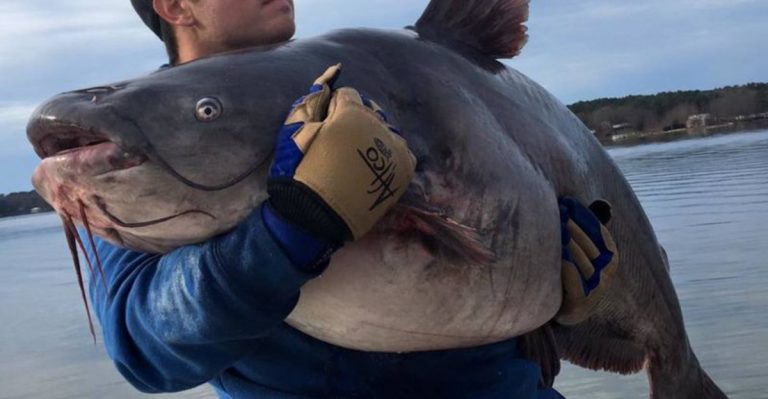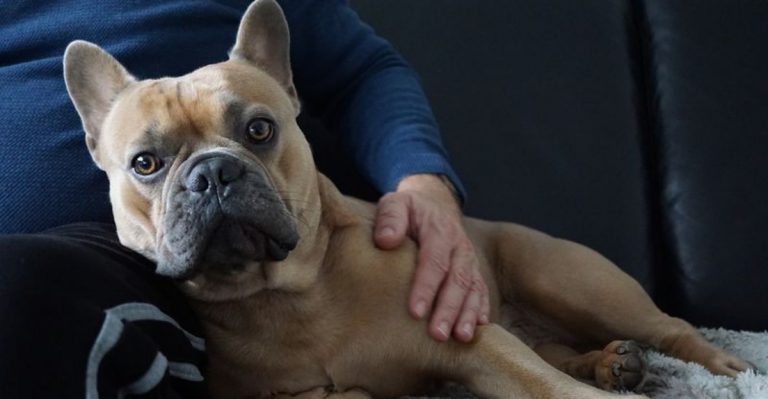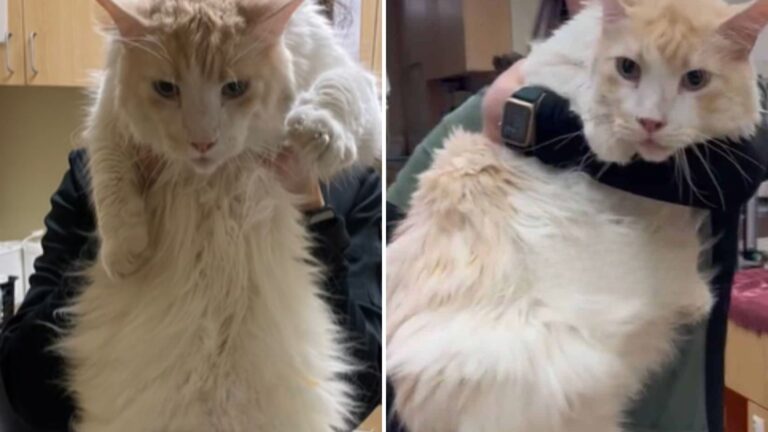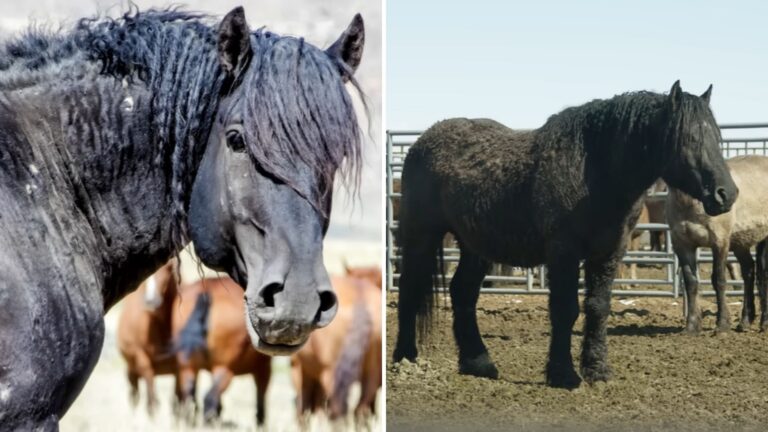Cat Licking Lips – 11 Possible Reasons For This Behavior
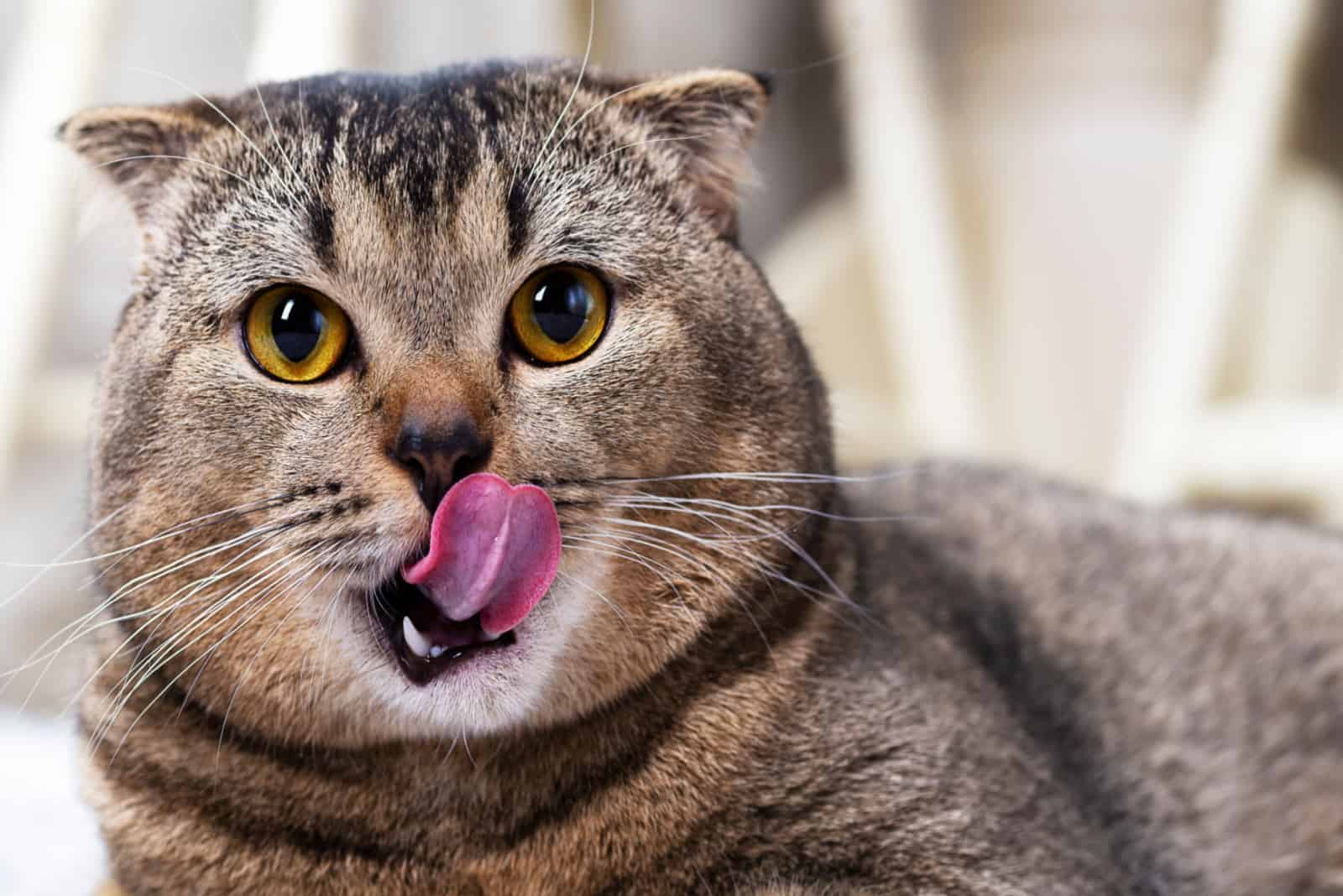
Seeing a cat licking lips may seem cute, and we are used to lip-licking as a normal part of a cat’s grooming process. However, excessive lip licking may be a sign that something is wrong, and that’s when we should begin to monitor our pet more closely and perhaps seek advice from a vet.
Almost every cat owner knows that cats tell us things through their body language . It is so important to be able to read your cat’s body language so you can recognise when extra care is needed.
Lip licking may be one of the indicators that something’s wrong with your feline friend. In case there is some underlying problem, you should monitor the cat’s behavior , look for additional symptoms, and contact your vet if the behavior continues.
If you want to explore some of the potential reasons for your cat licking lips , then read on and find out what to do!
11 Possible Reasons For A Cat Licking Lips
When cats are experiencing certain problems, it can often be identified in changes in the cat’s behavior . If you suspect something is wrong, you need to monitor the cat’s behavior and its body language in order to work out what’s wrong and how to help them. Cats are known for their ability to hide any illness they have so they are not likely to come to you for help.
A cat licking its lips excessively may be a normal part of its grooming routine, but it could also be an indicator of certain health issues that may require professional attention.
Here are 11 possible reasons for your cat licking lips that you should know about. As always, if you have any concerns, the best place for advice is your veterinary clinic.
1. Grooming
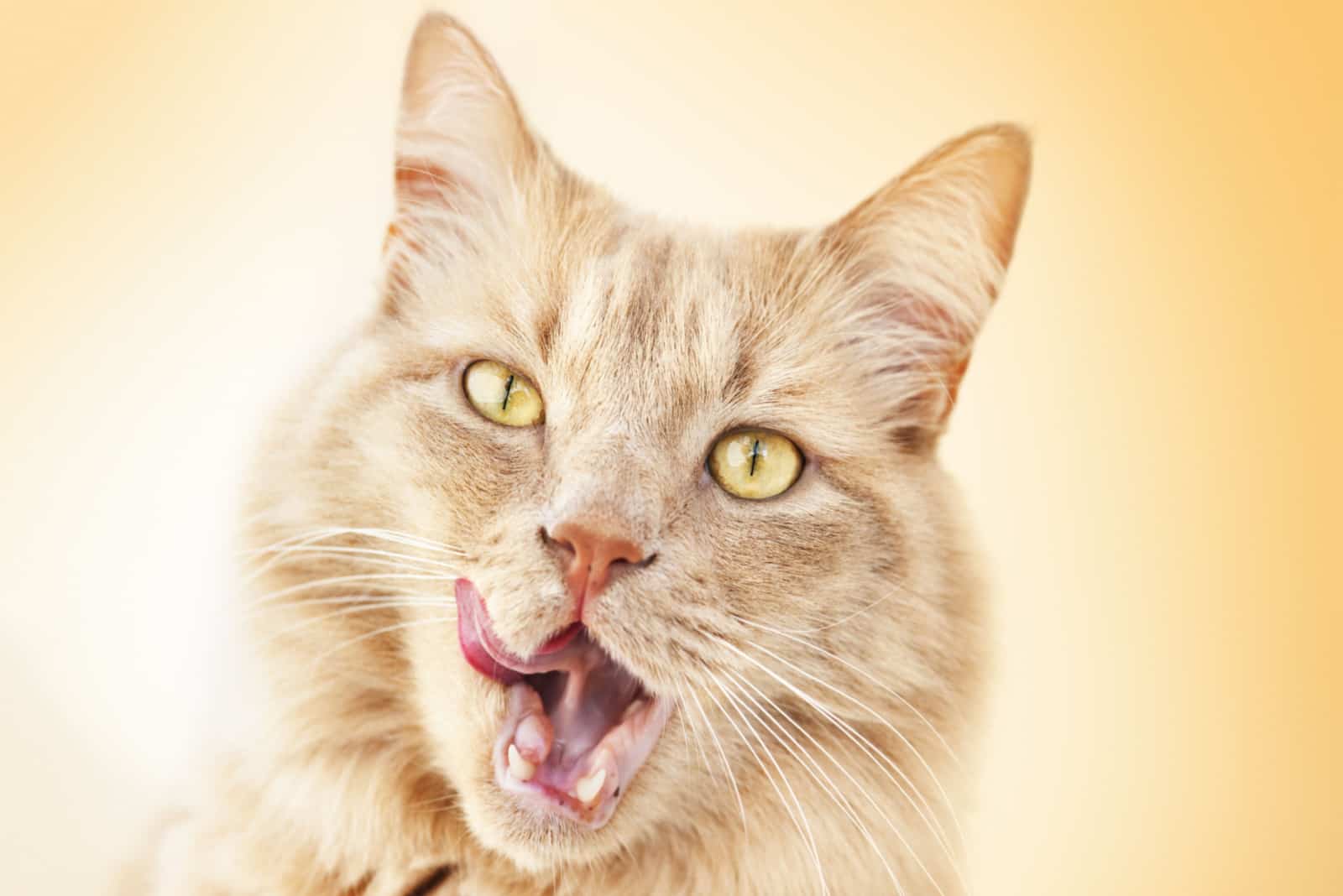
Almost everyone knows that cats are extremely clean animals who spend most of their day grooming in order to keep their fur clean and sleek.
Lip licking is a completely normal part of a cat’s grooming process , especially after eating something delicious when they’re trying to clean the area around their mouth and get every morsel of food they might have missed!
However, some cats groom themselves more than others. If you notice your cat licking lips and this is unusual for your cat, try to monitor this behavior for a while.
If you notice that this particular behavior occurs after eating cat food or drinking water, without any other symptoms, then you should relax, because your feline friend is probably just cleaning herself. If it happens at other times, then it may be a sign that something is wrong.
2. Nausea
A cat licking lips is typical behavior when your cat is experiencing nausea. Nausea happens when a cat has an upset stomach, usually after eating something that isn’t good for them.
In this situation, your cat isn’t feeling good, and it’s expressing this discomfort through lip licking . Other symptoms that can occur alongside lip-licking due to nausea include:
• Licking
• Dry heaving
• Drooling
• Chewing
• Dehydration
Occasional nausea may simply mean your cat has eaten something that disagrees with its stomach. Cats shouldn’t be nauseous all the time, so if the nausea keeps going on it means that there’s an underlying cause that needs to be identified. More serious causes for nausea may be:
• Cancer
• Diabetes
• Kidney disease
If you suspect that your cat is nauseous, it’s best to seek advice from a vet who can identify the cause. If the cause for nausea is diet-related, then the vet may suggest a more balanced diet, which mostly requires wet cat food and fresh water to keep the cat hydrated.
However, if the lip-licking behavior or other symptoms don’t stop, then the vet will probably run some more tests to find the underlying cause in order to treat the cat properly.
3. Anxiety
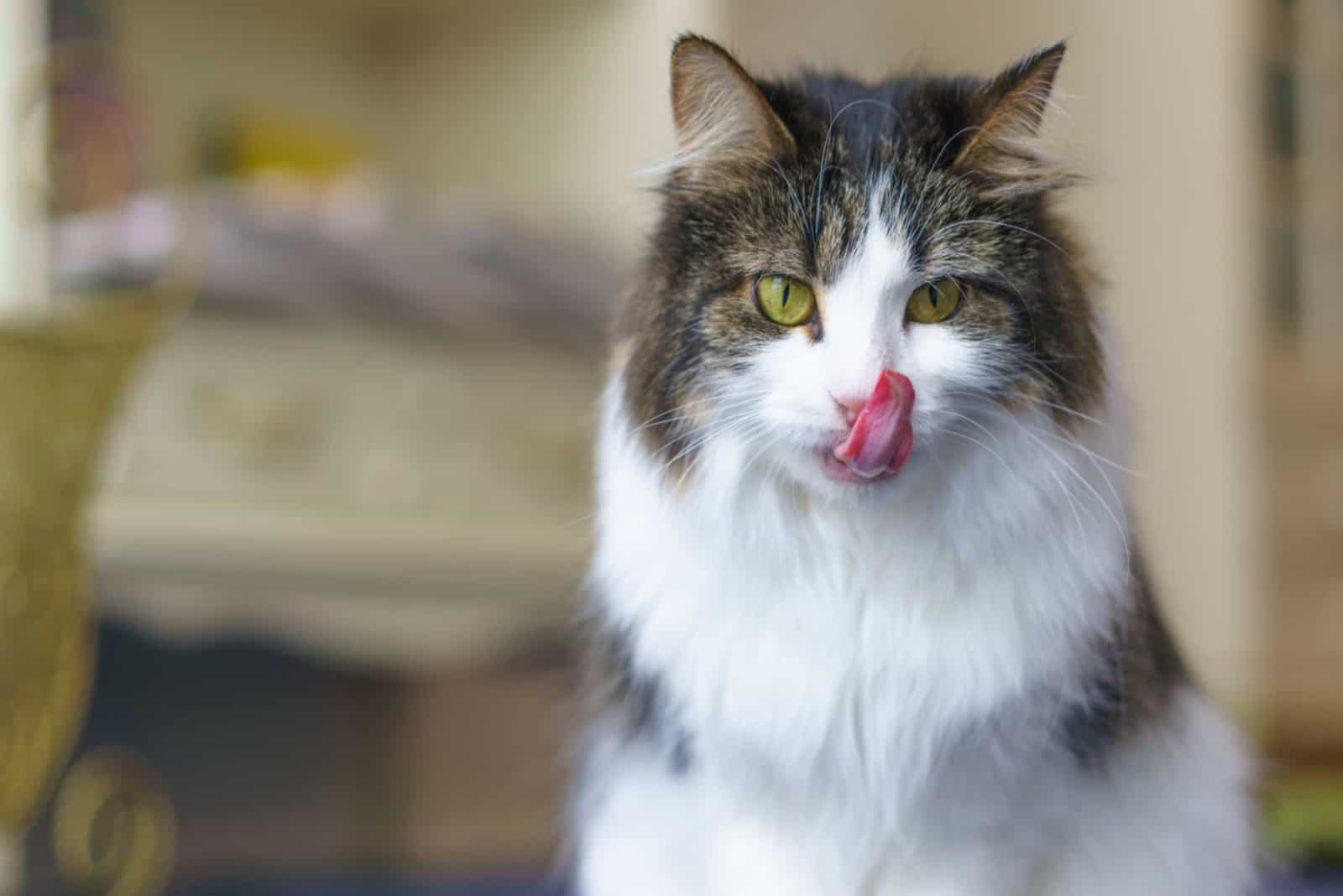
Anxiety is one of the traumatized symptoms in cats . Sometimes when a cat has experienced a traumatic event that has caused her to be anxious, stress may cause symptoms such as excessive lip licking.
Fortunately, this isn’t a serious issue as your cat’s health isn’t in immediate danger. However, anxiety is not good for a cat’s health and the problem still requires a solution. In order to solve this problem you need to first discover what caused the trauma and what kind of things trigger your cat’s anxiety.
You may remember a traumatic event that your cat experienced, or you may be able to work it out based on the types of things that cause your cat to become stressed, for example loud noises, strangers, etc.
Cats are creatures of routine, so perhaps you have recently made changes to their routine which are causing them anxiety. Sources of stress include new people in their home, new home, new pets, renovations, etc.
After figuring out the source of the anxiety, try to fix the problem, or try helping a cat accept the new changes in order to prevent them from excessive lip smacking in the future.
It takes time for cats to accept new things, however you both need to be patient. The key to success is to show the cat that the new change is good and that you are there for them.
4. Unusual Taste
Cats are very curious animals; there’s a good reason for the phrase “curiosity killed the cat”!. Curious cats may taste different foods, plants, or foreign bodies , just to investigate them.
The unusual taste of these things may cause cats to lick their lips. Simply tasting these things shouldn’t really cause cats any serious problems.
However, ingesting poisonous things may lead to health issues that require immediate medical attention. If you think that your cat has ingested something poisonous or if it displays any other worrying symptoms, you should contact your vet immediately and ask for help.
5.Toxic Food
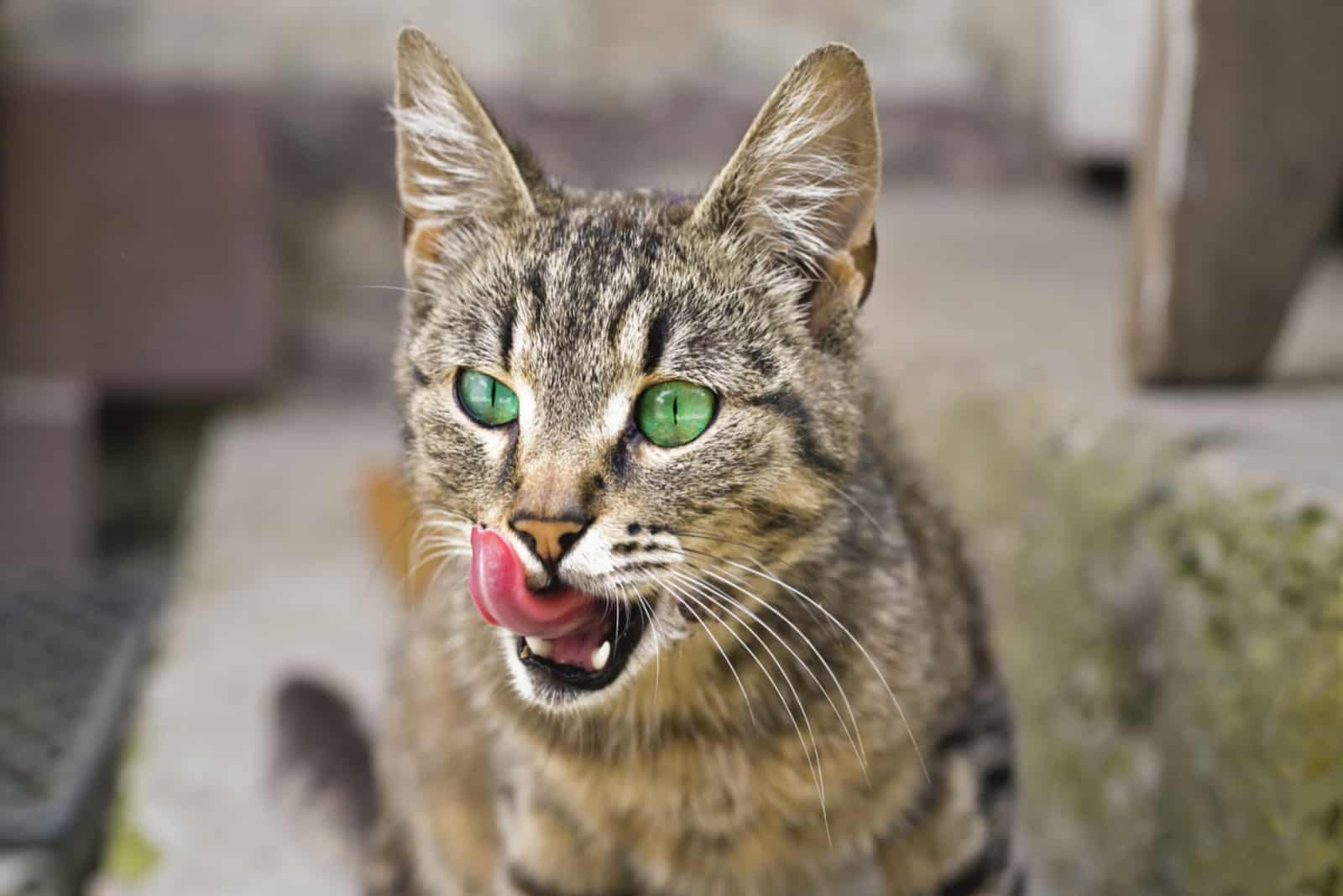
Lip licking may be present in cats after they have eaten toxic food. Unfortunately, cats don’t always realize that certain foods are simply bad for them. Therefore, when they eat it, their stomach may get irritated. This might cause indigestion or nausea, leading to cat licking lips or salivating.
If a cat has eaten something toxic, they may display the following symptoms. If you notice these signs, take your cat to the vet immediately.
• Vomiting
• Breathing difficulties
• Salivation
• Loss of appetite
• Coma
• Not drinking
Your cat requires professional help if it is showing these symptoms. If not treated on time, this can be really dangerous for your feline.
6. Allergies
Just like humans, some cats may be prone to certain allergies. A cat licking lips may be experiencing the symptoms of allergies such as being irritated and itchy.
Various things may cause cat allergies; certain scents, foodstuffs, or other environmental factors such as mites , pollen, grass, etc. The important thing is to look out for symptoms that will confirm that the lip smacking is due to an allergic reaction.
Symptoms that usually point to allergies include:
• Skin irritation
• Itching
• Breathing difficulties
7. Dry Mouth
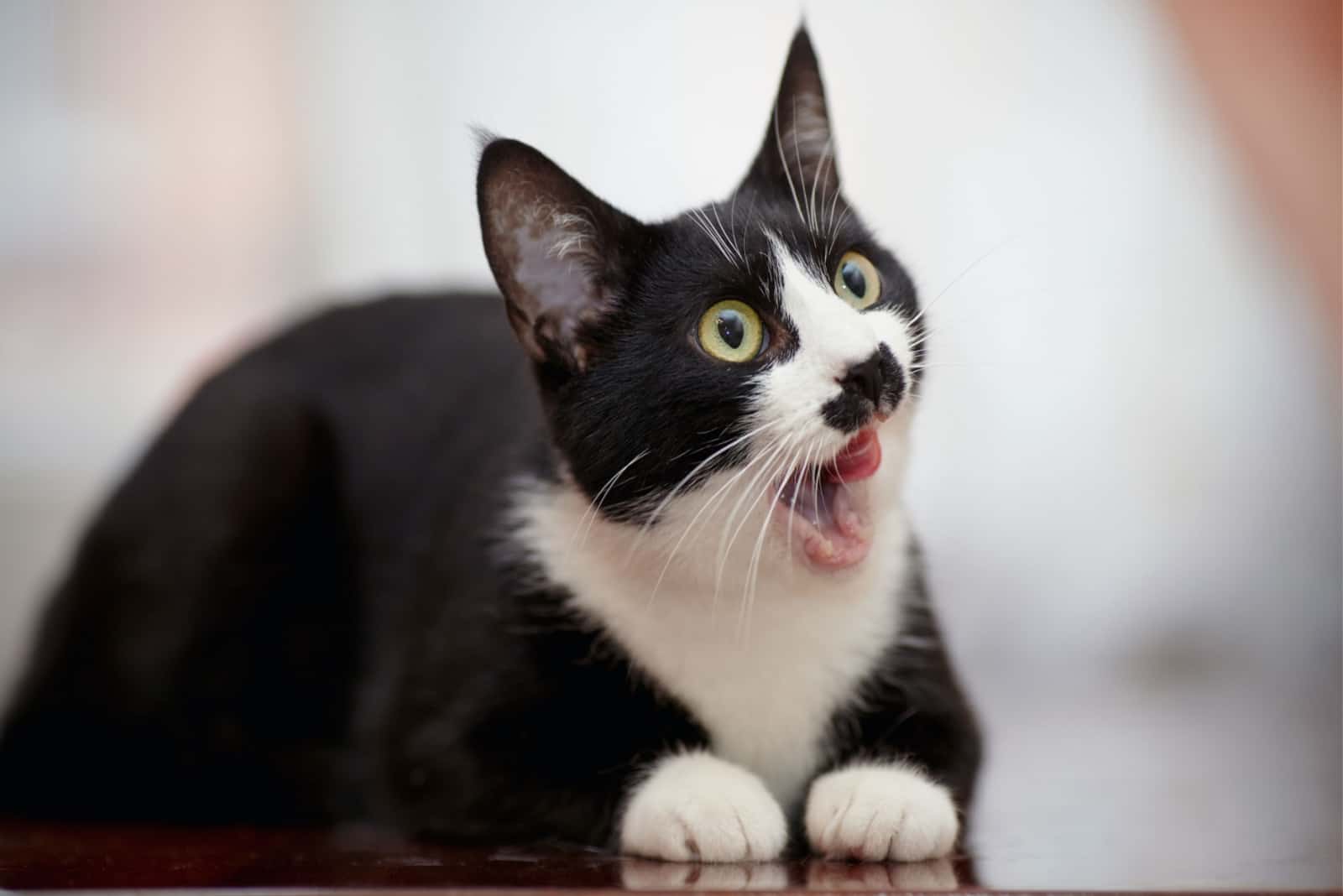
Another reason for a cat licking lips may be because of a dry mouth . This condition is also called xerostomia , and it’s usually temporary.
This may happen due to debris and fur that build up on a cat’s tongue , forming hairballs , leading to a dry mouth . This condition may be accompanied with a fever or dehydration. Luckily, the condition can be easily treated in order to return the saliva level to normal again.
Moreover, there are other common reasons for a cat’s mouth being dry, such as medications including antihistamines, sedatives, diuretics, anesthetics, and similar.
If your cat is dealing with a dry mouth problem, you can consult with your vet. The vet may suggest some of the following things:
• Use wet cat food because it’s richer in moisture
• Use pet-safe mouthwash
• Brush the cat’s teeth every day
• Use water additives to prevent infections
• Use pilocarpine to normalize saliva production
8. Ptyalism
The opposite of dry mouth is a condition called ptyalism . This condition refers to the excessive production of saliva, and lip licking is one of the main symptoms, as the cat tries to pick up all the excess saliva.
Another symptoms of ptyalism may include:
• Loss of appetite
• Pawing at their face
• Aggressive behavior
• Irritation
• Vomiting
• Swallowing issues
If you notice some of these symptoms in your cat, it’s most likely that your feline friend is dealing with ptyalism and you should consult with your vet in order to find out how to treat it effectively.
9. Oral Diseases
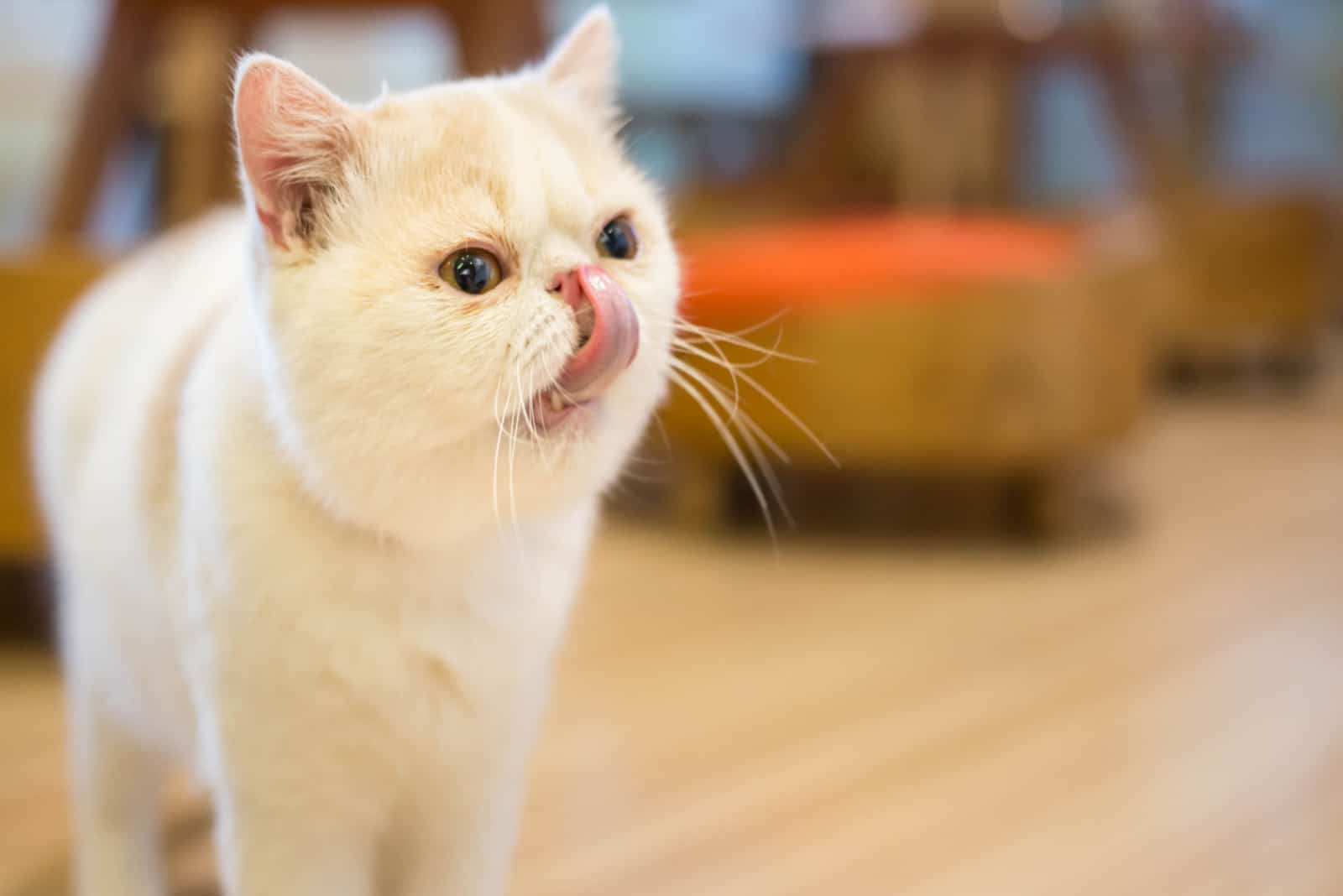
Lip smacking or licking may also be one of the symptoms of various oral diseases . One of the most common oral diseases are oral ulcers which cause pain and irritation around the cat’s mouth , leading to lip licking and excessive swallowing .
Other common oral issues are dental issues . There are a lot of dental conditions that mean a cat licks its lips and these require special help.
Some of these dental issues include:
• Periodontitis – bacteria that gets deep inside the gum line causing abscess and infection.
• Gingivitis – bacterial oral infection that causes red and swollen gum lines and bad breath .
• Tooth Resorption – this is when a problem occurs inside the tooth but eventually it resolves by itself. It’s known that 30% to 70% of cats suffer from this specific condition, often due to unknown causes.
• Oral Tumors – this is a more serious condition that can develop anywhere in the mouth. It may cause the cat discomfort and pain which is why your cat may lick its lips, as licking helps them manage the pain more easily.
If you suspect that the common cause for lip licking is connected to oral issues, then you should take your cat to the vet as soon as possible.
After a check up , your vet will know if your cat is suffering from any dental diseases and how serious they are. Older cats are more prone to these health issues than younger ones.
Sometimes, the condition is easy to treat, and sometimes it requires dental surgery. Either way, there are certain things that you can introduce into your cat’s routine to prevent future oral or dental problems .
It’s very important to brush your cat’s teeth every day. In the beginning your cat may not feel comfortable with you brushing their teeth, but with a lot of patience and time (as well as rewards!), the cat will eventually accept it.
The most crucial thing for dental health is your choice of cat food . If you feed your feline wet cat food , make sure that it’s top quality. However, besides wet cat food , make sure that you introduce a dry kibble to your cat’s diet. Dry food is the perfect way to get plaque and tartar off of a cat’s teeth to keep them healthy.
10. Compulsive Disorders
Obsessive-compulsive disorder (OCD) is a condition that includes repetitive motions that we associate with humans but it may also affect cats and dogs.
Lip-smacking is one of the main symptoms in obsessive-compulsive disorder . However, there are also other symptoms that may help you recognize this condition:
• Repetitive meowing
• Chewing fabric
• Sucking objects or paws
• Excessive pacing
If you notice some of these symptoms repeating excessively, you should take your cat to the vet for a check up. The vet will run blood tests and urinalysis in order to find out if the behavior may be caused by an infection or illness.
For the treatment of OCD, the vet may prescribe behavior modification drugs. Always pay close attention to the vet’s instructions in order to avoid overdosing or similar issues when using this type of medication.
11. Upper Respiratory Infection
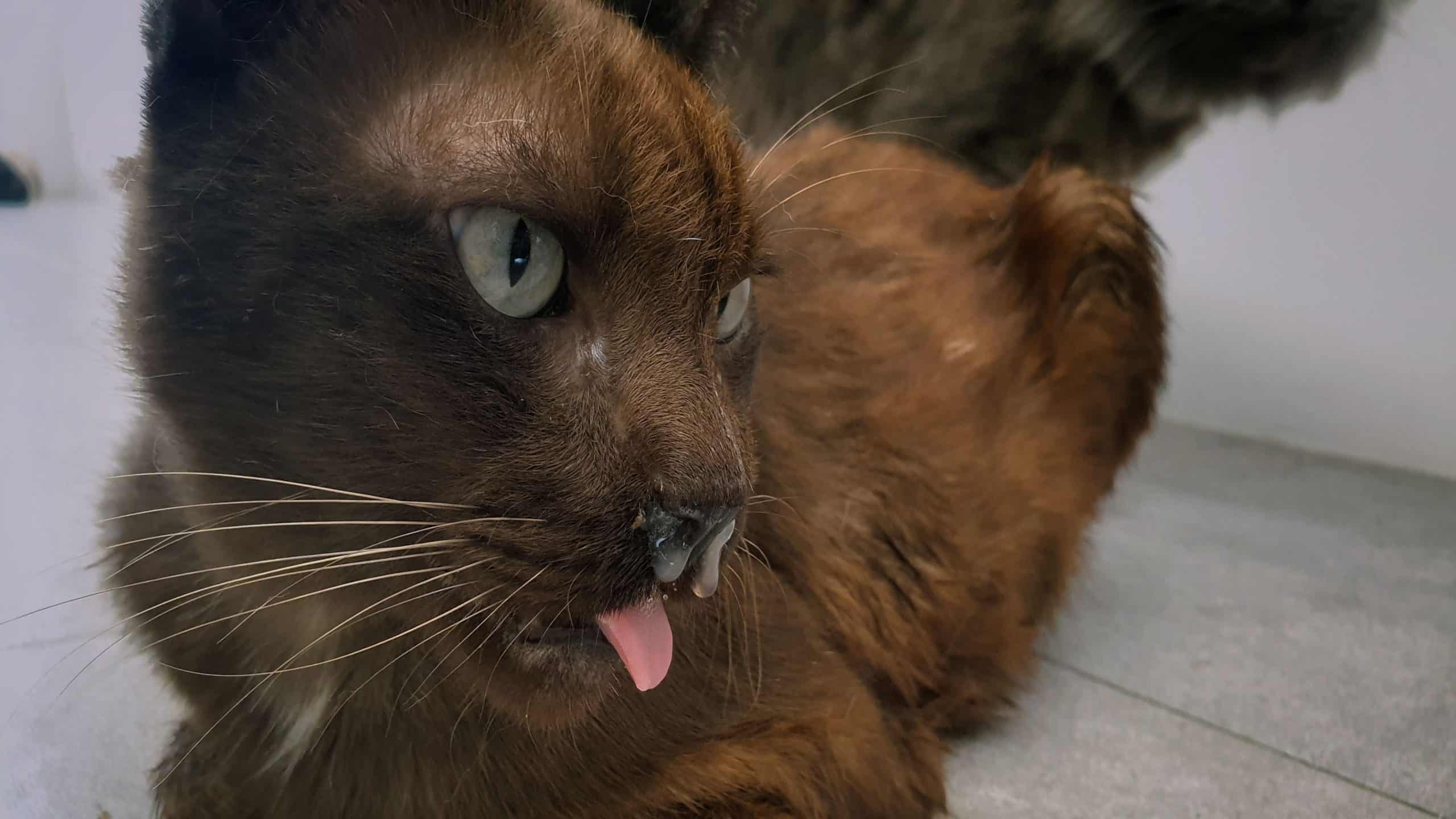
Upper respiratory infections can be very common in cats and the symptoms are often similar to those of the common cold in humans. This can occur due to infection with either viruses or bacteria. As cats are vulnerable to colds, cats that live outdoors are more prone to this issue than indoor cats.
Things that may cause the respiratory illness in cats are:
• Chlamydia
• Bordetella
• Fungal infection
• Feline herpesvirus
• Feline calicivirus
Treatment for this condition is very important. Your vet may prescribe certain medications to treat the condition, as well as a special diet. More serious conditions may require the use of IV to restore fluids.
During the treatment period you need to provide your feline friend with a lot of fresh water and encourage it to eat more. You can do this by using strong-smelling cat food that contains tuna or fish, as it may help your cat eat more if they have a poor appetite.
What To Do When A Cat Keeps Licking Its Lips?
Now that you know the possible reasons for a cat licking lips , it’s important to know the next step. So, if you notice this behavior in your feline friend , first of all, try monitoring the cat’s behavior .
If that behavior happens right after the cat eats a meal, or drinks some water, then you should relax because the cat is probably licking its lips in order to clean them.
However, if your cat behaves unusually, or seems anxious or scared, then this behavior may mean that something is making them stressed or uncomfortable. It may be a sign of trauma, so it’s very important to find the underlying cause for the anxiety and try to avoid the trigger.
If you suspect that there is a more serious medical issue, then the best thing is to take your cat to the vet. The vet will probably ask you questions about the cat’s behavior which will help them in diagnosing the problem.
They will also run specific tests and check the cat over completely in order to find out what’s wrong.
After the diagnosis is established, the vet will prescribe specific treatment for the condition, and it’s very important to follow the vet’s instructions if you want your cat to get better soon.
In Conclusion
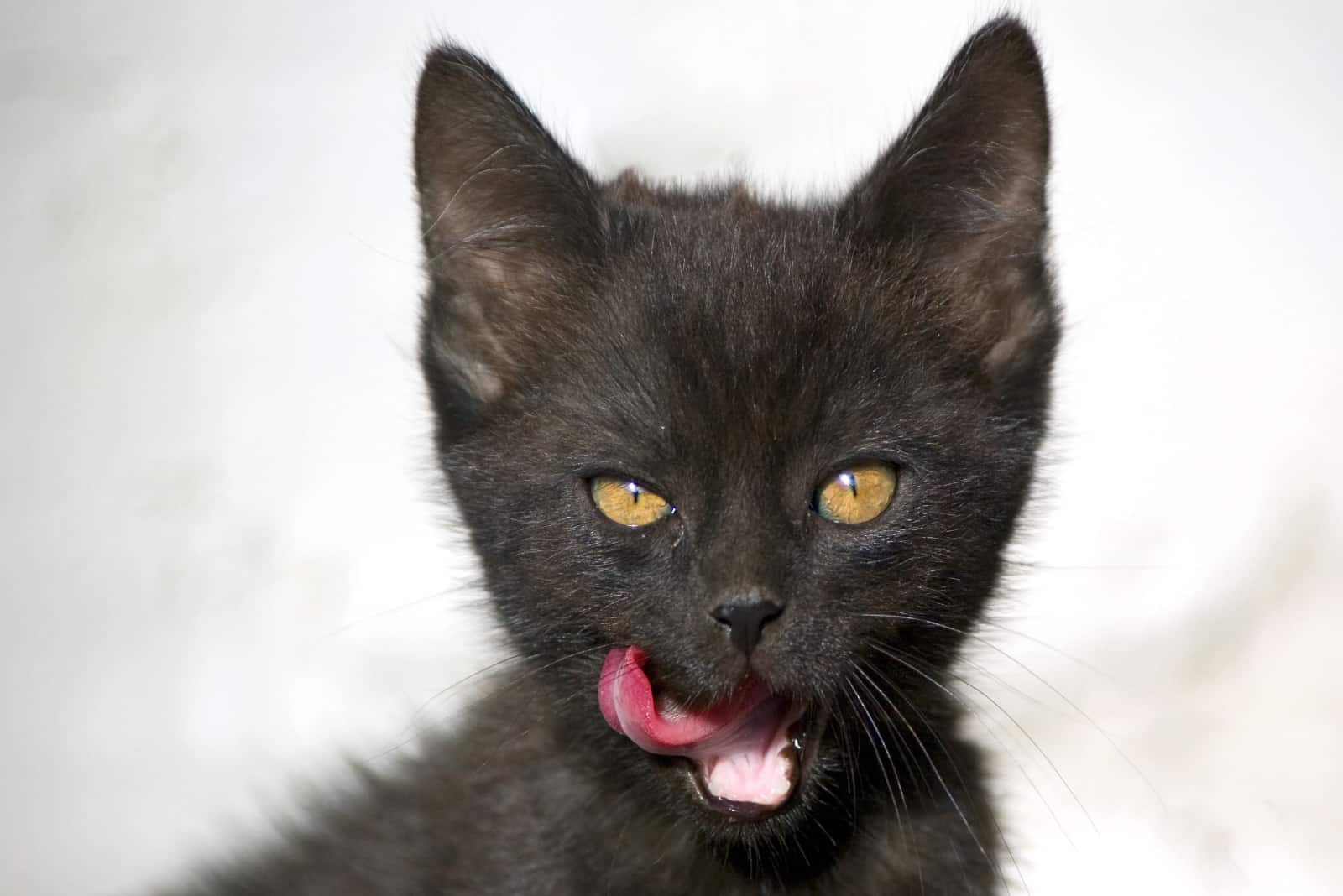
Seeing your cat licking lips may seem adorable, however, you should know that this behavior sometimes requires your attention.
Cats express their feelings through their behavior , therefore lip-smacking may mean that something’s wrong with them, that something’s causing them pain, irritation, or discomfort.
This article provides you with 11 possible reasons for your cat licking lip that should be helpful when seeking the underlying cause.
If you suspect that this behavior points to more serious health issues, then you should take your feline friend to the vet to check her properly and get her the right treatment.
Make sure that you follow the vet’s instructions if you want to get your feline friend back on track as soon as possible!


